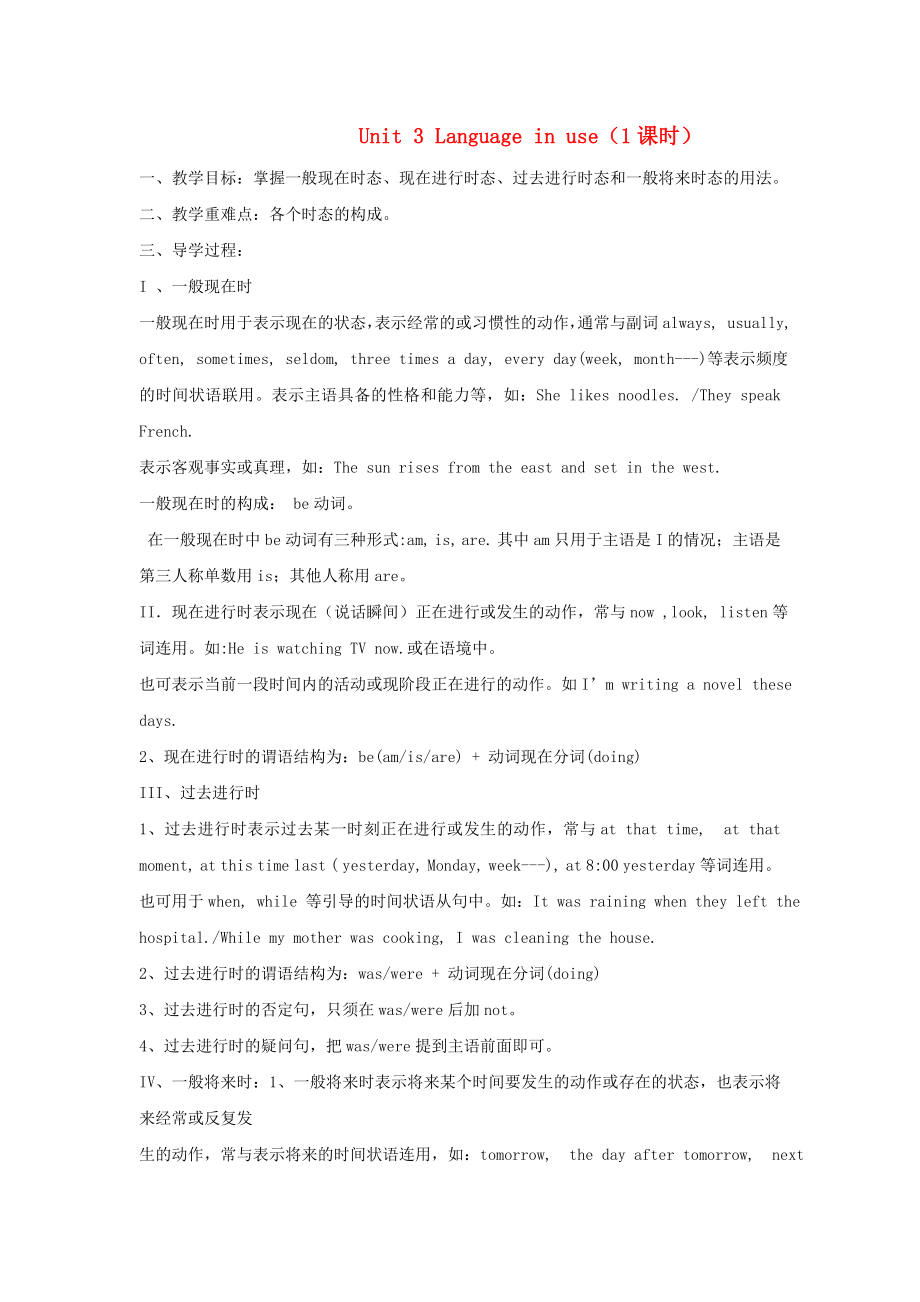《九年級(jí)英語(yǔ)上冊(cè) Module 1 Unit 3導(dǎo)學(xué)案(無(wú)答案) 外研版》由會(huì)員分享�,可在線閱讀�,更多相關(guān)《九年級(jí)英語(yǔ)上冊(cè) Module 1 Unit 3導(dǎo)學(xué)案(無(wú)答案) 外研版(2頁(yè)珍藏版)》請(qǐng)?jiān)谘b配圖網(wǎng)上搜索。
1、此資料由網(wǎng)絡(luò)收集而來(lái),如有侵權(quán)請(qǐng)告知上傳者立即刪除�。資料共分享,我們負(fù)責(zé)傳遞知識(shí)���。
Unit 3 Language in use(1課時(shí))
一���、教學(xué)目標(biāo):掌握一般現(xiàn)在時(shí)態(tài)���、現(xiàn)在進(jìn)行時(shí)態(tài)�����、過(guò)去進(jìn)行時(shí)態(tài)和一般將來(lái)時(shí)態(tài)的用法���。
二、教學(xué)重難點(diǎn):各個(gè)時(shí)態(tài)的構(gòu)成����。
三����、導(dǎo)學(xué)過(guò)程:
I �����、一般現(xiàn)在時(shí)
一般現(xiàn)在時(shí)用于表示現(xiàn)在的狀態(tài)��,表示經(jīng)常的或習(xí)慣性的動(dòng)作���,通常與副詞always, usually, often, sometimes, seldom, three times a day, every day(week, month---)等表示頻度的時(shí)間狀語(yǔ)聯(lián)用�。表示主語(yǔ)具備的性格和能力等,如:
2�����、She likes noodles. /They speak French.
表示客觀事實(shí)或真理��,如:The sun rises from the east and set in the west.
一般現(xiàn)在時(shí)的構(gòu)成: be動(dòng)詞��。
在一般現(xiàn)在時(shí)中be動(dòng)詞有三種形式:am, is, are. 其中am只用于主語(yǔ)是I的情況����;主語(yǔ)是第三人稱單數(shù)用is�;其他人稱用are���。
II.現(xiàn)在進(jìn)行時(shí)表示現(xiàn)在(說(shuō)話瞬間)正在進(jìn)行或發(fā)生的動(dòng)作���,常與now ,look, listen等詞連用�����。如:He is watching TV now.或在語(yǔ)境中���。
也可表示當(dāng)前一段時(shí)間內(nèi)的活動(dòng)或現(xiàn)階段正在進(jìn)行的動(dòng)作�。
3��、如I’m writing a novel these days.
2����、現(xiàn)在進(jìn)行時(shí)的謂語(yǔ)結(jié)構(gòu)為:be(am/is/are) + 動(dòng)詞現(xiàn)在分詞(doing)
III、過(guò)去進(jìn)行時(shí)
1�、過(guò)去進(jìn)行時(shí)表示過(guò)去某一時(shí)刻正在進(jìn)行或發(fā)生的動(dòng)作�,常與at that time, at that moment, at this time last ( yesterday, Monday, week---), at 8:00 yesterday 等詞連用�����。也可用于when, while 等引導(dǎo)的時(shí)間狀語(yǔ)從句中。如:It was raining when they left the hospital./While
4��、 my mother was cooking, I was cleaning the house.
2�����、過(guò)去進(jìn)行時(shí)的謂語(yǔ)結(jié)構(gòu)為:was/were + 動(dòng)詞現(xiàn)在分詞(doing)
3����、過(guò)去進(jìn)行時(shí)的否定句�,只須在was/were后加not。
4��、過(guò)去進(jìn)行時(shí)的疑問(wèn)句����,把was/were提到主語(yǔ)前面即可���。
IV�����、一般將來(lái)時(shí):1����、一般將來(lái)時(shí)表示將來(lái)某個(gè)時(shí)間要發(fā)生的動(dòng)作或存在的狀態(tài)��,也表示將來(lái)經(jīng)?��;蚍磸?fù)發(fā)
生的動(dòng)作���,常與表示將來(lái)的時(shí)間狀語(yǔ)連用,如:tomorrow, the day after tomorrow, next (week, Sunday, month, year---) ,
5����、 soon, in two hours, in the future等。
如:I’m going to make a model plane by myself tomorrow.
She is going to see her parents next month./They will be back soon..
2�、一般將來(lái)時(shí)的謂語(yǔ)結(jié)構(gòu):助動(dòng)詞(will 或be going to)+ 動(dòng)詞原形
四、課堂練習(xí):A:用所給詞的適當(dāng)形式填空�����。
(1).??Jim _________ (write) a letter at that moment.
(2).??When
6、the telephone ________ (ring), she ________ (do) her housework.
(3).?Jack often _________(watch) TV after work these days.
(4).She will write to you as soon as she ______ (get) there.
(5). The students ______________(listen) to the birthday song now.
B.選擇填空��。
(1).- —Does Jim have a pear? –Yes, h
7����、e _____.
A. is B. have C. do D. does
(2). My brother __________ for Shanghai next Wednesday.
A. leave B. leaves C. is leaves D. is leaving
(3). There ________ less pollution in five years.
A. was B. will have C. has D. will be
(4).
8、 We _______ music and often ______ to music.
A. like ,listen B. likes, listens C. like ,are listening D. are like, are listening
(5). Look, the taxi ______ now.
A. came B. come C. comes D. coming
五���、教后反思:____________________________________________________
_________________________________________________________________
 九年級(jí)英語(yǔ)上冊(cè) Module 1 Unit 3導(dǎo)學(xué)案(無(wú)答案) 外研版
九年級(jí)英語(yǔ)上冊(cè) Module 1 Unit 3導(dǎo)學(xué)案(無(wú)答案) 外研版

